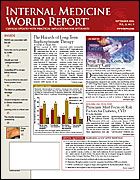Publication
Article
Internal Medicine World Report
Metabolic Syndrome: Summary Measure or True Biologic Category?
Author(s):
Diabetes Care
Adding fuel to the already fiery controversy regarding the viability of the metabolic syndrome as a clinical category, results of a new study suggest that using the metabolic syndrome concept does not provide additional risk information beyond its individual components (. 2006; 29:1673-1674).
Investigators looked at a community cohort of 2322 men from the ongoing Uppsala Longitudinal Study of Adult Men, an ongoing study of all available men born between 1920 and 1924 in Uppsala County, Sweden. Four baseline samples were analyzed: 2 were defined at age 50 years and included both the entire group and a primary preventive sample (n = 2198) that excluded those with myocardial infarction, stroke, or diabetes at or before study onset; and 2 baseline samples from a reexamination of the men at age 70 years that included the entire group (1221) and the primary preventive sample (n = 872).
The baseline sample taken at age 50 years was followed for 32.7 years, and the baseline sample taken at age 70 years was followed for 11.4 years. The theory that the metabolic syndrome predicts cardiovascular mortality better than the sum of its components was evaluated by comparing areas under receiver-operating characteristic curves and using likelihood ratio tests.
At age 50 years, 17.8% of the men were classified as having the metabolic syndrome, including 15.9% of the primary prevention sample. At age 70 years, 23.2% of the men qualified for the metabolic syndrome, including 15.8% of the prevention sample. Overall, 502 men died from cardiovascular disease after their examination at age 50 years, and 133 died at age 70 years.
Based on these results, the investigators, led by Johan Sundstr?m, MD, PhD, of the Department of Medical Sciences, Uppsala University, Uppsala, Sweden, and coleagues, conclude that, "the metabolic syndrome did not predict cardiovascular mortality independently of its individual components at any age and in any sample in the present study, irrespective of the method used."
These results and those from other studies questioning the benefit of this concept in clinical practice, the American Diabetes Association is quick to emphasize, do not take away from the reality that the individual components of the metabolic syndrome must be the focus of all physicians when assessing risk factors that may signal diabetes or cardiovascular disease.





